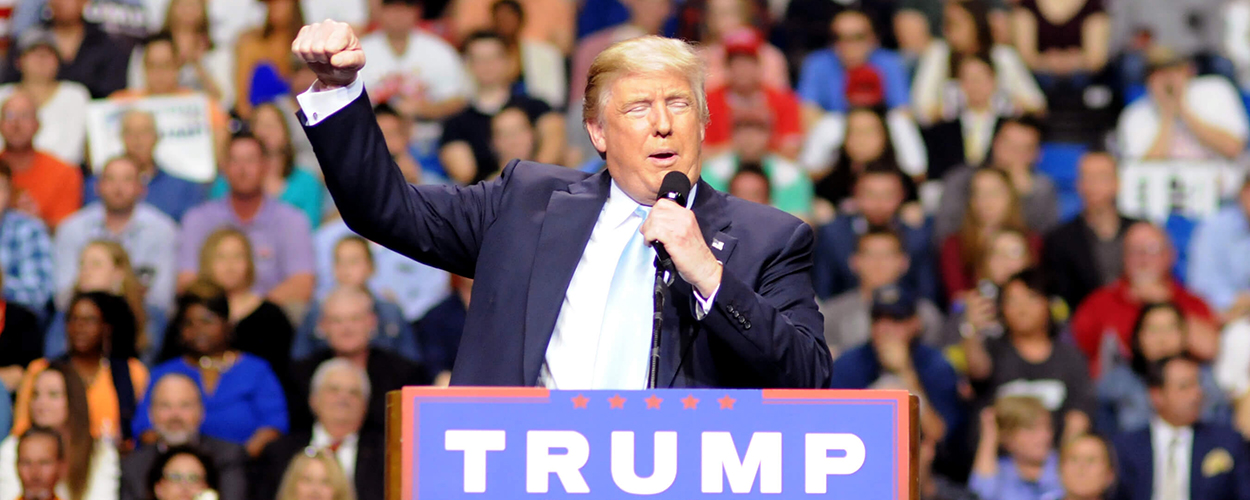This website uses cookies so that we can provide you with the best user experience possible. Cookie information is stored in your browser and performs functions such as recognising you when you return to our website and helping our team to understand which sections of the website you find most interesting and useful.
And Finally Artist News Labels & Publishers
Musicians call on politicians to stop using their music without permission
By Andy Malt | Published on Wednesday 29 July 2020

A group of musicians – including Elton John, Sia, Lorde, Linkin Park, REM, Pearl Jam and Alanis Morissette – have signed a letter calling on US politicians to stop using music in their political campaigns without asking first.
“This is the only way to effectively protect your candidates from legal risk, unnecessary public controversy, and the moral quagmire that comes from falsely claiming or implying an artist’s support or distorting an artists’ expression in such a high stakes public way”, says the letter, organised by the Artist Rights Alliance.
The letter notes that this is “not a new problem”, nor one that is limited to any one specific political party. “Every election cycle brings stories of artists and songwriters frustrated to find their work being used in settings that suggest endorsement or support of political candidates without their permission or consent”, it says.
Of course, while the signatories here are right to say that this is not a new issue, the whole thing has become a much bigger deal since Donald Trump made his entry into politics, with pretty much every artist whose music he plays at his rallies unhappy that he has done so.
“Being dragged unwillingly into politics in this way can compromise an artist’s personal values while disappointing and alienating fans – with great moral and economic cost”, the letter goes on. “For artists that do choose to engage politically in campaigns or other contexts, this kind of unauthorised public use confuses their message and undermines their effectiveness”.
“Music tells powerful stories and drives emotional connection and engagement”, it adds, “that’s why campaigns use it, after all! But doing so without permission siphons away that value”.
Among the signatories are The Rolling Stones’ Mick Jagger and Keith Richards, who recently said that they believed they had sound legal grounds to sue Trump over his use of their music at rallies.
Generally, of course, the use of music at public events – political or otherwise – is covered by the blanket music licences held by the venues in which they take place. However, US collecting societies BMI and ASCAP also offer specific licences for political campaigns – mainly because events staged by such campaigns don’t always take place in conventional venues – and artists can withdraw their music from that particular licensing set-up.
Also, once a campaign is using one of those specific political licences, it is not meant to rely on venue licences for any songs that have been specifically excluded from its own deal. The Stones have now withdrawn their music from the Trump campaign’s BMI licence and sent a cease and desist letter saying that any future use of their music at the President’s rallies could result in legal action.
That said, those technicalities have never really been tested in court. Although some lawyers reckon there are actually other grounds to block the use of music at political events, even where general BMI and ASCAP licences do apply. And earlier this week Neil Young, whose name is not on the letter, also said that he was considering legal action over the use of his music at Trump events.
Things are slightly less complicated in copyright terms if and when politicians use music in videos or on social media – where bespoke sync licences are almost certainly needed.
The letter discusses this, saying that publishing such content without a licence “can violate federal and (in some cases) state copyrights in both sound recordings and musical compositions. Depending on the technology used to copy and broadcast these works, multiple exclusive copyrights, including both performance and reproduction, could be infringed”.
Moving on to some of those other potential legal issues that may arise when politicians use music without specific permission, the letter also talks about the impact on the “creators’ rights of publicity and branding”, possible “trademark infringement, dilution, or tarnishment under the Lanham Act”, and possible claims for “false endorsement, conversion, and other common law and statutory torts”.
And, it says, “when campaign commercials or advertisements are involved, a whole additional host of rules and regulations regarding campaign fundraising (including undisclosed and potentially unlawful ‘in-kind’ contributions), finance, and communications could also potentially be breached”.
Moving away from legal issues, it adds: “More importantly, falsely implying support or endorsement from an artist or songwriter is dishonest and immoral. It undermines the campaign process, confuses the voting public, and ultimately distorts elections. It should be anathema to any honest candidate to play off this kind of uncertainty or falsely leave the impression of an artist’s or songwriter’s support”.
Of course, as the letter states at the outset, none of this is new. These arguments have been made many times in the past, with disputes over music in political videos even going to court.
And yet politicians continue to use music without first gaining consent, whether doing so within the rules or not. So it remains to be seen if lots of artists all complaining about this issue together, rather than one by one, can change any of that.
“No politician benefits from forcing a popular artist to publicly disown and reject them”, the letter insists. “And on social media and in the culture at large, it’s the politicians that typically end up on the wrong side of those stories”.
Read the complete letter and see the full list of signatories here.





